Home » IPU delegation meets the Oireachtas Joint Committee on Health
A delegation from the IPU including President Dermot Twomey; Secretary General Sharon Foley; Chair of PCC Kathy Maher; Head of Governance and Pharmacy Services Dr Susan O’Dwyer and Director of Public Affairs and Communications Jim Curran, appeared at the Oireachtas Joint Committee on Health on 8 March to discuss the potential of community pharmacy and the significant contribution the sector can make to the development and future of healthcare. In this article, Jim Curran, provides an overview of the committee hearing.


In his oral presentation to the Oireachtas Health Committee, IPU President Dermot Twomey highlighted the role of the pharmacist as a healthcare professional and the significant benefits that can accrue to both patients and the State from expanding the role of the pharmacist.
Mr Twomey told the Committee members that community pharmacy can, and will, play a vital role in the development and implementation of future healthcare reform, in line with Sláintecare, supporting people to stay healthy in their homes and communities for as long as possible. He informed the Committee that increased investment in the sector was required, and that community pharmacies can and do deliver services with a proven dividend in terms of value for money, improved patient outcomes, and greater access to primary care for the entire population.
He briefed the Committee on a number of key areas including widening the scope of pharmacy-based minor ailment services; accessing contraception via a structured consultation with a pharmacist; proactive management of medicine shortages; developing a national strategy for pharmaceutical care by appointing a Chief Pharmaceutical Officer; and increasing resources in community pharmacy through reinvestment and fee restoration.

Mr Twomey stated that the implementation of a pharmacy-based Minor Ailments Scheme in Ireland would support national healthcare principles of delivering care that is equitable, accessible, proximal to the patient and sustainable, and could ease pressure on GP settings by freeing up one million GP appointments, as patients could then utilise the existing infrastructure of community pharmacists for their minor ailment.
Acknowledging International Women’s Day, he highlighted to the Committee members that it has been reported on multiple occasions that women, both in Ireland and internationally, would prefer to obtain their contraceptive from the pharmacist: “There is no clinical reason for oral contraceptives to be supplied only on foot of a prescription – with proper protocols this is a very safe and effective healthcare intervention”.
The Committee was informed of the significant impact of medicine shortages on patients and pharmacists, and that what was urgently required as part of a solution to these ongoing issues was the ability of pharmacists to be able to therapeutically substitute medicines, without the need to revert to the GP for a prescription, in cases where there is a critical shortage of medication.
The absence of a Chief Pharmaceutical Officer was also raised, and the Committee was told that one of the most fundamental and seismic changes which could be prioritised to unlock the potential of community pharmacy, “would be to develop an agreed national strategy for pharmaceutical care to deliver better health outcomes for patients. This should be owned by the Minister for Health and driven by the appointment of a Chief Pharmaceutical Officer within the Department of Health”.
In conclusion in his oral presentation, Mr Twomey emphasised that to fully deliver on better health outcomes, the community pharmacy sector must be adequately reimbursed with investment in the sector. He highlighted that June 2023 is the deadline for the Minister’s commitment to review the fees paid to pharmacists, and that these fees have not changed since 2009, and have not kept in line with crippling inflation.
The Committee responded very positively to the presentation and the delegation was praised for the quality of both the opening address, and the briefing paper that had been circulated.

Fine Gael Deputy Colm Burke (Cork North Central) acknowledged the critical role that pharmacists have played, particularly during the COVID pandemic and the subsequent vaccination programme, which he said “was appreciated by everyone”. Deputy Burke was particularly interested in the appointment of a CPO, and questioned how the IPU’s proposals on access to contraception without a prescription were being progressed with the Department of Health.
Green Party Deputy Neasa Hourigan (Dublin Central) was also interested in how the IPU’s proposal on access to contraception was progressing, and in particular if there was resistance from other groups to the IPU’s demands. In response the Deputy was informed that when emergency medication was made available without prescription there were concerns that there may be increased use but studies have shown this did not happen and the medication is being used appropriately and safely. The IPU delegation also shared the Deputy’s frustration at the slow progress in the rolling out of a national eHealth strategy.
Sinn Féin’s Health Spokesperson Deputy David Cullinane (Waterford) described the introduction of a Minor Ailment Scheme as a “no brainer”, a term that was also used by People Before Profit-Solidarity TD Gino Kenny (Dublin Mid-West). Deputy Cullinane also expressed concern at the level of medicine shortages, and was supportive of the IPU’s call for a Serious Shortage Protocol.
Deputy Kenny also described as “ludicrous” that a prescription is required for women to access contraception.
Social Democrats Deputy Róisín Shortall (Dublin North-West) was also interested in the shortage of pharmacists, and felt that there was a key role in this regard for the Department of Health working in conjunction with the Department of Further and Higher Education. As with other Members, she was very supportive of maximising the potential of community pharmacy.
In response to Deputy Bernard Durkan (Fine Gael, Kildare North), IPU President Dermot Twomey outlined that the area that would make the most impact in the short-term from a services perspective was the introduction of a Minor Ailment Scheme and accessing contraception without a prescription.
The issue of reimbursement was raised by Deputy Durkan and the IPU delegation reminded the committee that pharmacy dispensing fees have reduced significantly since 2008, and that we need to be fairly remunerated as a sector and profession.
Fine Gael’s Seanad Spokesperson on Health Senator Martin Conway thanked the delegation for attending and for the IPU’s detailed presentation, as well as for the phenomenal work that pharmacists have done to support our society during the pandemic. He was particularly interested in pharmacies being allowed to screen for cardiovascular disease and for pharmacists to provide additional services, including the HPV vaccine. He was also very supportive of a CPO.
Fine Gael Senator Maria Byrne also supported the IPU’s call for a CPO, and outlined concerns about medicine shortages. The Senator also paid tribute to the role of pharmacies during the pandemic; “When people could not get access to GPs or hospitals, they relied on their community pharmacists, so they deserve a big ‘thank you’ for that. The role they played was vital.” The issue of pharmacist shortages was also raised.
The Chairman of the Committee, Sinn Féin Deputy Sean Crowe (Dublin South-West), said that members of the Committee would all accept the idea of an expanded role for pharmacists and had a sense of frustration with regard to progress. He committed on behalf of the Committee to get an update from the Department of Health on the Minor Ailment Scheme and on the potential for the appointment a Chief Pharmaceutical Officer.
The Chairman was of the view that a Serious Shortage Protocol could be implemented with some legislative changes and was supportive of the concept. He is also keen that the number of third level places available for pharmacy students be addressed, and said that this was an issue that the Committee could raise with the Minister for Further and Higher Education.
After being proposed by Deputy Shortall and seconded by Deputy Hourigan, the Committee agreed a motion to call on the Minister for Health to take immediate steps to make oral contraceptive available without prescription from community pharmacies, as is the case in many other countries.
Finally, the IPU delegation will submit an expanded paper on our proposals for the recruitment of a Chief Pharmaceutical Officer to the Committee.
A copy of the transcript of the meeting can be found at www.oireachtas.ie > Debates > Committee debates > Read recent committee debates > search for Health committee 08 March.
Jim Curran

Director of Public Affairs and Communications
Highlighted Articles